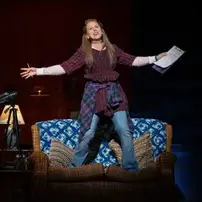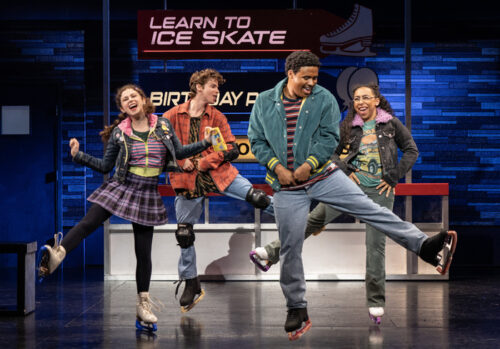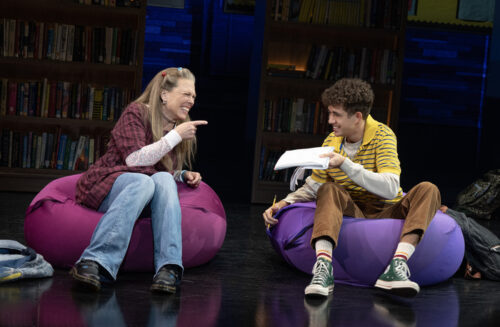Broadway at TPAC
Kimberly Akimbo
The premise to this show is both common and strange. Kimberly is a 16 year old dealing with her dysfunctional family, teenage aspirations, and high school. What is strange is that she looks like a 60 year old woman due to a rare genetic disease. While a vague and fictional illness, it’s loosely based on progeria. This show somehow has strong morals and a powerful message while having me completely onboard with comic underage felonies.

The show is set in 1999, as the playbill says, “Before kids had cell phones.” This is an excellent choice, not only sticking with the setting of the original play, but avoiding the often cringy and dated attempts at hipness that other Broadway plays have recently made (like flossing in Mrs. Doubtfire and Wendy needlessly recording a TikTok in Peter Pan). Carolee Carmello does a great job of playing a teenager despite her real life age of 62. Her motions and manner of speaking feel like those of a teenage girl without any forced girlishness. Her voice is heavy with vibrato, unlike the other singers, adding to the difference. The other cast members playing her teenage friends are excellently cast. I think they’re actually teenagers, or if not, so close you can’t tell the difference. This is especially important in this show because you need Kimberly to stand out as an elderly-looking woman hanging with teens.
The show begins at the skating rink. We’re introduced to Seth, Kimberly’s love interest, and four other teenagers who not only have conflicting crushes on each other (forget love triangle, I’m not even sure what shape this one makes), but who are focused on their show choir studies. Kimberly interacts shyly with them. Then after a simple but satisfying downpour of snow her dad Buddy picks her up over two hours late because he’d been out drinking. At home is her narcissist mother singing my favorite song from the show “Hello, Darling,” which is her recording a video to the baby she is pregnant with.

The music to the show is solid. David Lindsay-Abaire’s lyrics are so good, and the music is fun and really grew on me. When I listened to the broadway cast recording after seeing the show I appreciated the music much more, despite the album’s sloppy overuse of pitch correction. Many of the songs are hilarious and perfectly matched to the on-stage action. The choreography to the show is often quite simple: singing to a camera while sitting on a couch, standing and facing the audience while singing a ballad. But there are other times where it’s surprising: the moment when characters who have been walking around on stage in ice skates go onto the ice and are suddenly skating around the stage (this bit of magic is done with liquid glycerin). “Happy for Her” is sung by Buddy while he’s driving Kimberly and Seth to school, and each move of the steering wheel results in realistic sways and bumps from the characters, getting sillier and sillier the more wildly Buddy drives. Simple slapstick is used when the group of teens tries to wash checks with Aunt Debra.
The pacing of the show is great. Two acts with one intermission, the first act introduces all the characters and their conflicts, and instead of leaving the second act to the denouement, the primary conflicts take place here. Kimberly’s criminal aunt Debra has followed them to their new home and takes over their basement, then convinces Kimberly and the other teens to join her in using a stolen mailbox for check fraud.

An aspect of the writing that is particularly good is the casual hurts that Kimberly experiences from everyone, their heedless remarks that remind her of her age or mortality. Except for her parents and Aunt Debra, no one is cruel or unkind; they’re just thoughtless teenagers. And Kimberly shows her hurt but doesn’t wallow in it, showcasing inner resilience and strength that not only is miraculous given her parents, but is the reaction that we’d all like to think we’d have in the same situation. Her love interest Seth also lets these casual comments slip, but we still like him. He shares an unhappy home life and a familiarity with tragedy, yet doesn’t let that control his life. His passion is for anagrams, which gives us the title of the musical: Kimberly Lovaco can be rearranged to say Cleverly Akimbo. Akimbo is to have a hand on the hip with the elbow turned out, or for another limb to be in a bent position. Merriam Webster clarifies that the term, while originally neutral, now implies defiance and confidence. Anagrams are the metaphor for the show in that you can take what you’ve been given and make something new with it. This is what Seth teaches Kimberly, and so we root for them because their relationship is more than just “he’s cute she’s cute.” Miguel Gil plays Seth with great musicality, charm, and enthusiasm.
The show isn’t just about nice teens being friends: Kimberly’s parents struggle and cause trouble for her, and her criminal aunt tries to involve the teens in an illegal enterprise. All three of these adults are delightfully and comedically horrible in their own ways, while remaining relatable in some aspects of their humanity.
The main struggle and message of the show are about mortality and living life now. In a scene where all the teenagers are sitting and talking, one of them says that right now isn’t real life, they’re just in purgatory for their future real lives. Each talks about what they’ll do in the future. Then they all look at Kimberly. She is silent: most with her condition don’t make it past sixteen, and she just celebrated that birthday. Unlike them, she’s stuck in the now because there is no future. In the touching song “Now,” they communicate how unreliable the future is, how they can hope to do things but keep in mind that tomorrow might never arrive.

We all face death, imminent or decades from now, we just don’t know. This show reminds us to face that death and allow the knowledge to prompt us to live life in the now. Like many old adages this sounds dully moralizing, but like all good fiction, this play brings this truth to life.
The end of the show doesn’t fix all the problems faced in the story, there’s no miracle cure or sudden reform of a parent. But it is uplifting and happy and brave, and the whole story’s sincerity ends sincerely. There’s some play logic: I’m totally in support of some federal felonies, and I’m able to laugh at the actually horrible parents and aunts and their activities. But the meaning is only helped by laughter.
Kimberly Akimbo is at TPAC through April 13. For more information, see Kimberly Akimbo | Tennessee Performing Arts Center and Kimberly Akimbo.



